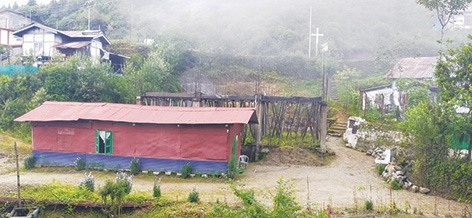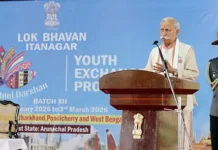ITANAGAR, Oct 6: The arrest of Tawang Revival Church pastor Joseph Singhi has sparked religious misgivings among the Christian community of the state.
Singhi was reportedly arrested at around 9:30 am on Tuesday by the Tawang police on the basis of an FIR lodged by the district land revenue & survey officer, allegedly for illegally constructing the church.
Singhi was later released on bail and the statements of eight other members who had accompanied Singhi were recorded by the police.
The church is located behind the district planning officer’s quarters in AIR Colony in Tawang. The Christian community in the district is claiming that they have been occupying the plot since 1999 and the church was built in the same year. It is said that they had applied for land allotment, which is reportedly not approved yet.
“We have been occupying said plot since 1999, and land allotment process was initiated from 2003. However, we are being unjustly deprived,” alleged Sonara Degio, vice president of the Arunachal Pradesh Christian Revival Church Council (APCRCC).
“We met the chief minister and the chief secretary over the pending land allotment issue in August. We were assured,” Degio said.
He added: “We forcibly started the church construction as part of renovation out of frustration, as we have waited enough for land allotment. How long should we wait for allotment?”
Sources in the Tawang district administration informed The Arunachal Times that they repeatedly issued notices to Singhi to stall the construction and dismantle the structures. The district administration had issued a similar notice in 2017.
The administration informed that the notice was issued on the basis of the Supreme Court direction of 29 September, 2009, that no unauthorized construction shall be permitted in the name of temple, church, mosque, gurudwara, etc, on public streets, public parks, and other public places.
The DA reportedly invoked Section 4(1) of the Arunachal Pradesh Public Premises (Eviction of Unauthorized Occupant) Act, 2003, after Singhi allegedly failed to comply with the order.
It is said that on 27 October, 2003, the then APCRCC executive secretary, evangelist Toko Loma, had submitted a representation to the then chief minister Gegong Apang, pleading for land allotment to build a church in Tawang. Loma claimed that the people of other faiths have their places of worship, like temple, monastery and mosque, in Tawang but the Christian community living in Tawang have no place of worship. Reportedly, Apang had asked the district administration to consider the representation.
Reacting to the news of the arrest, APCRCC president Tai Ete termed the incident “injustice and unjust.”
“We don’t consider the construction as illegal. We have been occupying that plot for the last 21 years (since 1999),” said Ete.
He said that if the eviction is at all being carried out on the basis of the Supreme Court order, the government should uniformly dismantle all illegal structures across the state.
“We have been facing problems ever since we started construction work in 2015, as the church was in a dilapidated condition. Our application for land allotment is yet to be approved. Somewhere, we feel that we are being religiously deprived and persecuted,” Ete said.
“We want dialogue with the organizations in Tawang, whoever is opposing. We don’t want to create disharmony and hurt anyone,” he added.
The APCRCC president appealed to Chief Minister Pema Khandu and union MoS for Minority Affairs, Kiren Rijiju to resolve the issue amicably. He also expressed displeasure over the Indigenous Faith and Cultural Society of Arunachal Pradesh’ (IFCSAP) complaint against the church authority over the plot.
It is reported that the IFCSAP and the Monpa Mimang Tsogpa had filed a complaint against the illegal construction of the revival church in Tawang. The organizations expressed apprehension that forcible construction of a church might create social disharmony in Tawang.
Reportedly, there is a blanket ban on land allotment in Tawang for a decade. Unverified sources informed that more than 200 land allotments issued to private and public parties had to be cancelled in 2007 after the district’s students’ union raised the issue.


